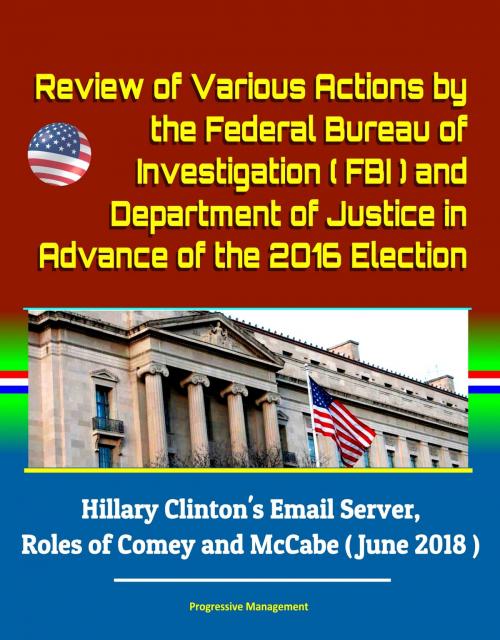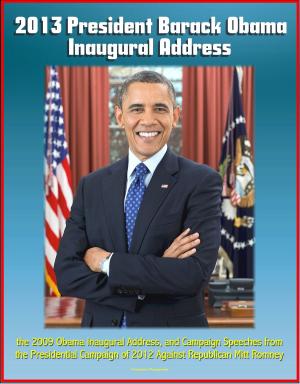Review of Various Actions by the Federal Bureau of Investigation (FBI) and Department of Justice in Advance of the 2016 Election: Hillary Clinton's Email Server, Roles of Comey and McCabe (June 2018)
Nonfiction, Social & Cultural Studies, Political Science, Politics, Law Enforcement| Author: | Progressive Management | ISBN: | 9780463278536 |
| Publisher: | Progressive Management | Publication: | June 14, 2018 |
| Imprint: | Smashwords Edition | Language: | English |
| Author: | Progressive Management |
| ISBN: | 9780463278536 |
| Publisher: | Progressive Management |
| Publication: | June 14, 2018 |
| Imprint: | Smashwords Edition |
| Language: | English |
This important and controversial report about the FBI investigation into Hillary Clinton's private email server was issued on June 14, 2018 and has been professionally converted for accurate flowing-text e-book format reproduction.
This report is divided into sixteen chapters. Following the introduction, Chapter Two summarizes the relevant Department policies governing the release of information to the public and to Congress and the conduct of criminal investigations, as well as the relevant statutes regarding the mishandling of classified information that provided the legal framework for the Midyear investigation. In Chapter Three, we provide an overview of the Midyear investigation, including decisions about staffing and investigative strategy. In Chapter Four, we discuss the decision to publicly acknowledge the Midyear investigation and former President Obama's statements about the Midyear investigation. In Chapter Five, we discuss the conduct of the investigation, focusing on the significant investigative decisions that were subject to criticism by Congress and the public after the fact. In Chapters Six and Seven, we describe the events leading to former Director Comey's July 5 statement and the Department's decision to decline prosecution of former Secretary Clinton. Chapters Eight through Eleven provide a chronology of events between the FBI's discovery of Clinton-related emails on the Weiner laptop in late September 2016 and Comey's letter to Congress on October 28, 2016, and describe the FBI's analysis of those emails and letter to Congress on November 6, 2016.
Chapter Twelve describes the text messages and instant messages expressing political views we obtained between certain FBI employees involved in the Midyear investigation and provides the employees' explanations for those messages. It also briefly discusses the use of personal email by several FBI employees, and provides an update on the status of the OIG's leak investigations.
Chapters Thirteen and Fourteen address allegations that then Deputy Director Andrew McCabe and then Assistant Attorney General Peter Kadzik should have been recused from participating in certain matters, or violated the terms of their recusals.
Chapter Fifteen addresses allegations that the timing of the FBI's release of FOIA documents and its use of Twitter to publicize the release were influenced by improper considerations or were otherwise improper. Chapter Sixteen includes our conclusions and recommendations.
This important and controversial report about the FBI investigation into Hillary Clinton's private email server was issued on June 14, 2018 and has been professionally converted for accurate flowing-text e-book format reproduction.
This report is divided into sixteen chapters. Following the introduction, Chapter Two summarizes the relevant Department policies governing the release of information to the public and to Congress and the conduct of criminal investigations, as well as the relevant statutes regarding the mishandling of classified information that provided the legal framework for the Midyear investigation. In Chapter Three, we provide an overview of the Midyear investigation, including decisions about staffing and investigative strategy. In Chapter Four, we discuss the decision to publicly acknowledge the Midyear investigation and former President Obama's statements about the Midyear investigation. In Chapter Five, we discuss the conduct of the investigation, focusing on the significant investigative decisions that were subject to criticism by Congress and the public after the fact. In Chapters Six and Seven, we describe the events leading to former Director Comey's July 5 statement and the Department's decision to decline prosecution of former Secretary Clinton. Chapters Eight through Eleven provide a chronology of events between the FBI's discovery of Clinton-related emails on the Weiner laptop in late September 2016 and Comey's letter to Congress on October 28, 2016, and describe the FBI's analysis of those emails and letter to Congress on November 6, 2016.
Chapter Twelve describes the text messages and instant messages expressing political views we obtained between certain FBI employees involved in the Midyear investigation and provides the employees' explanations for those messages. It also briefly discusses the use of personal email by several FBI employees, and provides an update on the status of the OIG's leak investigations.
Chapters Thirteen and Fourteen address allegations that then Deputy Director Andrew McCabe and then Assistant Attorney General Peter Kadzik should have been recused from participating in certain matters, or violated the terms of their recusals.
Chapter Fifteen addresses allegations that the timing of the FBI's release of FOIA documents and its use of Twitter to publicize the release were influenced by improper considerations or were otherwise improper. Chapter Sixteen includes our conclusions and recommendations.















